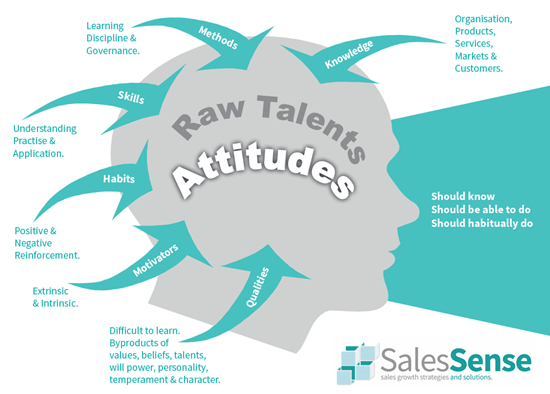Assess key sales manager skills for selection, development, and training.

Do you need to improve sales results? The easiest way to influence results is through sales manager skills. Call me now or schedule a Zoom call. I'll share some secrets. Reach out today for a sales management skills development special offer.
This page presents a model of sales manager skills and competencies for development, assessment, and selection.
What is a sales manager?
Those who manage sales territories are often given the title of sales manager. The competencies described on this page assume the other meaning. Someone responsible for leading or supervising a team of salespeople.
Sales manager competencies provide a framework and benchmark for appraisal and development of existing staff and for assessing new hire candidates.
Why use a sales manager skills competence model?
Many benefits accrue to those who make competence models a central pillar of their business. Appraisals become more transparent, balanced, and fair. Selection can be based on verifiable knowledge, abilities, and habits. And staff can be expected to take the initiative for their own development.
Better management, lower staff turnover, and more motivated people all contribute to increased sales and profits.
You can use the twenty-three key sales manager skills and competencies summarised below as a base for developing your own sales management competence model.
Take a shortcut. Have us do the work for you. We have done it before, so we can help you get there, faster. Schedule a call with Clive Miller here to explore the potential.
Learn More about key sales manager skills and creating competence models.
What are key sales manager skills and competencies?
1. Answering Common Customer Questions
Setting an example and providing leadership is reflected in a manager's ability to answer important customer questions.
Buyers have in mind six common questions when considering new purchases or suppliers.
Managers who use good answers inspire confidence, lead by example, and help their team members communicate with more credibility and confidence.
See the questions here.
Schedule a call to test your answers here.
Have Clive Miller lead a one-hour virtual workshop to optimise your top six answers. Learn more.
2. Market and Industry Understanding
Managers with expert knowledge of their market and industry, find it easier to maintain or improve the same knowledge in their staff.
Through their expertise, they inspire those around them to increase their expertise. Expert market and industry understanding, helps salespeople develop important contacts and recognise worthwhile opportunities. It helps them establish credibility, communicate value, and develop trust.
3. Customer and Prospect Understanding
Managers who understand the types of businesses their staff are selling to can inspire staff to adopt the same diligence in their dealings with specific customers. The ability to persuade depends on understanding. Knowing how a customer’s business works, helps salespeople position the value they offer and acquire trusted advisor status. Those with customer knowledge are more able to help salespeople qualify effectively and maintain accurate sales forecasts.
4. Company Understanding
Managers who know their company's goals, objectives, strategy, needs, strengths, and weaknesses understand the capabilities and resources available to address the market opportunities and are better placed to guide staff.
Test sales knowledge with our free assessment.
Have us prepare onboarding and learning materials for your markets, customers, sales prospects, and company. Learn more.
5. Selecting the Right Salespeople
Those who can choose the right salespeople, significantly reduce dependence on most other sales manager competencies.
Take our Hire Top Performers course, one-to-one. or as a group.
6. Setting the Right Expectations
People who know precisely what is expected of them, in terms of behaviour and results, are more likely to achieve the desired outcomes. This is often referred to as delegation. Salespeople are normally incentivised through a performance-linked compensation plan related to territory, account, or new business sales results. While delegation can be part of a sales manager's responsibilities, the foremost direction comes from a salesperson's compensation plan.
- Steer Behaviour With the Right Sales Commission Plans
- Daring Ways to Focus and Motivate Sales Teams
- Learn how to use a Responsibilities and Tasks template.
7. Affecting Motivation
Rewards and payments aside, people do things for their own reasons. The ability to leverage Intrinsic motivators enables managers to affect motivation without spending money.
- Take our free Sales Motivation Assessment.
- Explore individual differences and motivations in a one-hour workshop.
8. Inspiring Development
The only lasting source of competitive advantage is to get better faster than competitors. This applies to soft skills and methods just as much to products and services.
- Inspire your team through a series of virtual self-development workshops.
- Use our free sales exam assessments.
- Assess sales and management practices.
9. Sales Coaching
Most managers get their promotion by being good at their job. The idea is that they should be able to teach others how to do the job as well as they did. Yet being a good sales coach on top of all the other sales management duties, can be very challenging.
Coaching salespeople is primarily about developing capabilities, while managing a sales team is primarily about getting results. The two ends of these duties can conflict.
- Coaching for Sales - A Decade of Transformation
- How a Coach Can Help You Find 25% More Business
- How to Get the Best From Sales Coaching
10. Sales Training
While a sales manager may not be expected to deliver training, they are expected to ensure their staff are trained. Being a sales trainer may not be at the top of a list of desirable sales manager skills, however, being able to deliver effective training aids in the process of managing staff training. Not all organisations have people dedicated to this task.
- The Best Sales Training Courses are Investments
- How to Prove that Sales Training is Worth the Investment
- B2B Sales Training Courses
11. Change Management
Change is inevitable. Creating a work environment where staff embrace change and take advantage of it, is an important aspect of success.
Change Management is a module in our sales management course. Take the course or just the modules that you need.
12. Choosing the Right Management Style
Good communication skills are a foundation stone of sales and management. Yet what constitutes good communication is circumstance and listener-dependent. Management style should take into account circumstances and personalities.
Management style and adapting for personality are modules in our sales management course. Take the course or just the modules that you need.
13. Managing Performance
The real test comes when performance is behind the target. Bullying tactics and threats are almost always counterproductive. Managers need an advanced warning when any aspect of sales performance is weakening. They need to know the factors that impact sales performance and be able to influence them. And when things get out of control they need to know how to get performance back on track.
- How to conduct a sales performance evaluation.
- Practical Actions to Quickly Fix a Sales Crisis
- Sales Crisis Management
14. Motivating Admonishment
Delivering motivating admonishment is a key sales management skill. No manager can remain effective for long without having to admonish behaviour or performance. Poorly done, admonishment makes things worse. Correctly done, it strengthens relationships, increases motivation, and repairs misalignment.
Motivating admonishment is a module in our sales management course. Take the course or just the modules that you need.
15. Managing Opportunity Qualification
Doing things right is a waste of time if those selling don’t first choose the right things to do. Qualification has a substantial impact on success. Managers who improve sales opportunity qualification, increase results.
Fourteen quantifiable statements score the likelihood of winning any B2B sale. Do you know what they are?
Are you using them to eliminate the guesswork?
- Try our free Sales Win Predictor.
- Arrange a virtual workshop.
16. Managing Forecast Accuracy
Apart from the necessity of an accurate sales forecast for good business management, it also helps a manager marshal resources to maximise results. So obtaining an accurate forecast from team members is a sales manager key skill.
Four distinct pillars underpin an accurate sales forecast. They are the sales stage, the sales stage conversion rate, quantified qualification, and the salesperson's confidence.
- Learn how to use the four pillars in a one-hour one-to-one call or group workshop.
17. Managing the Sales Process
Using a system or method that has proved effective elsewhere provides a benchmark for measuring progress and a common language for communicating internally. A sales manager key skill is the ability to get team members using a sales process. Managing with frameworks and checklists helps people avoid mistakes and develop better methods.
18. Understanding Strategy
Since managers are almost always directly involved in higher value opportunities and such deals normally depend on the work of several people, understanding how to use competitive strategy to keep a team focused on the right actions, is a considerable advantage.
Competitive strategy is a module in our Winning Complex Sales course. Have us deliver just the strategy module, one-to-one or for a group.
19. Understanding Politics in Organisations
As for strategy, higher-value deals almost always involve many people in a customer's organisation and consequently, higher-value decisions are almost always entangled with an organisation's politics. Understanding politics in customer organisations gives a sales manager a considerable advantage.
Understanding organisational politics is a module in our Winning Complex Sales course. Have us deliver just the politics module, one-to-one or for a group.
20. Problem Solving and Dealing with Obstacles
Traditional selling skills remain important in a sales manager competence model because it is sometimes necessary to lead from the front. Sales managers may need to demonstrate better planning, communication skills, objection handling, negotiation, and closing skills.
21. Pipeline Management
If marketing activities don't generate enough leads and enquiries, salespeople must be able to find their own. Effective and efficient prospecting can make all the difference when business is hard to come by. Managers who can help staff overcome these challenges are less likely to suffer from a dwindling pipeline.
22. Managing Meetings
Motivating internal meetings are a boon that builds motivation and momentum. Badly managed internal meetings have the opposite effect.
Managing Meetings is a module in our sales management course. Take the course or just the modules that you need.
23. Organisation and Time Management
Making good use of the time available is an important part of management success.
Take a one-to-one coaching programme to develop better organisation and time management habits.
Other Key Sales Manager Skills Resources on this Site
If you need a customised model of key sales manager skills and competencies, a sales manager skills assessment tool, or sales management training, get in touch. Telephone +44 (0)1392 851500. We will be pleased to learn about your needs and discuss some options. Alternatively, email custserv@salessense.co.uk or use the contact form here.























